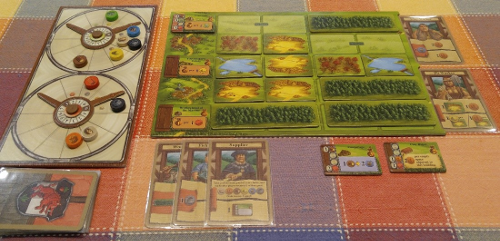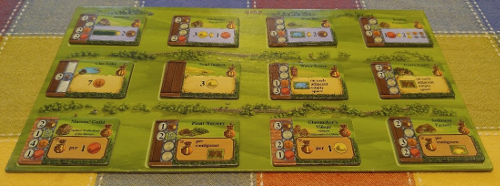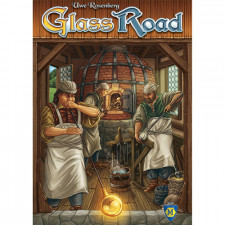Glass Road Review
on Sep 28, 2017
Do a Google image search for “Glasstrasse†(i.e., Glass Road). The fantastical glassworks located in the picturesque Bavarian Forest look like they’re straight out of Alice in Wonderland. You can’t help but marvel at these pieces of art. Even though I would be more likely to break one of those beautiful glass sculptures than create one, I can pretend to be master craftsman by playing Glass Road.
In a mere four rounds, Glass Road challenges you to gain resources to construct as many buildings as you can to score the most points. You’ve heard this song before, but just wait for the hook. You need to juggle two different production wheels and choose the right combination of actions from a selection of 15 specialist cards. These specialists are what you’d expect in a standard glassmaking squad. They let you gain more materials, place pits/groves/ponds, or construct buildings, all in various ways and combinations. In fact, your crew is so dedicated to glassmaking that most of the time they’re willing to do their action twice. That is, of course, only if they can do it solo. There’s the hook.

Glassmaker, glassmaker, make me some glass.
Each round, you whittle down your 15 specialists to a glassmaking boy band size of five cards. Then, players simultaneously select one to play on their turn. Going around the table, you reveal which specialist made the cut. If anyone else has that specialist in their hand, they get to play it out of turn, resulting in you both only getting to do one action. Think of the specialists as hipsters who only like burning charcoal if no one else is doing it. As you can probably guess, trying to pick five cards for the round often involves some double-think. You might not want to select the Forest Manager on your turn, but you’ll include him in your pick of five because you see someone else going heavy in the grove building. Piggybacking off others is key and makes you feel pretty sly when it works. Unless it’s a 2-player game, not all the cards you select will get played, so even just getting one bonus action can be a big deal in a game where you’re only guaranteed a minimum of 12 actions.
On top of this, both turn order and the order you play your cards matters immensely. If two people select the same specialist for the round, only the first person in turn order will cause it to get pulled from others’ hands. You can reap the full double action benefit from your specialist if you end up playing it second (or third or fourth). This is yet another one of the many points of consideration in the otherwise simple concept of “pick a card and do the actionâ€. However, Glass Road is as much about figuring out the right action to take as it is about resource management.
I mentioned you have two production wheels. Each wheel produces various goods; some overlap and others do not. When goods are gained, the tokens move up. Any time there is an empty space, the wheel shifts, consuming your resources and creating brick or glass. You have no choice in the matter. You’re like a glassworks DJ, balancing the timing of your two turntables to create a perfectly synchronized beat. Just when you have the right amount of sand, you realize it’s about to be used up for glass. Hopefully you planned for this; probably you didn’t. Dealing with the two wheels can be frustrating, especially on your first play or two. However, once you get the timing down, manipulating the wheels for that clay-to-brick combo is more satisfying than playing Coachella. You can’t avoid creating brick or glass, just to store up the others goods either. Both resources are necessary for constructing most of the buildings, which are your main source of points.

More building options than Home Depot.
Once constructed, buildings do one of three things for you: convert goods into other goods, provide an immediate effect, or provide endgame points. Deciding among the buildings is tough. Do you get to build a Fish Yard now and hope you can get a 2x2 shape of ponds before the end of the game? Should you just build a Shed and immediately gain a glass? What about a Sand Factory that converts food to sand? Given how short the game is, it can often feel like you’re only just getting started on making something substantial before things end.
Glass Road is as quick as it is tight. In typical Rosenberg fashion, you have a ton of options available to you, but very little time to do them all. The game isn’t so much about building a glassmaking engine as it is making your limited choices count. At the end of the game, you won’t see a board with grandiose glassworks. You’ll have a smattering of buildings and some additional pieces of land. You may lose with a score of 21.5 to an opponent who has a whopping 23 points. Still, all of these restrictions are what makes the game so compelling. After all, those amazing glassworks were not made without effort either.

 Customer Support
Customer Support  Subscribe
Subscribe 




 Account
Account  Wishlist
Wishlist 

